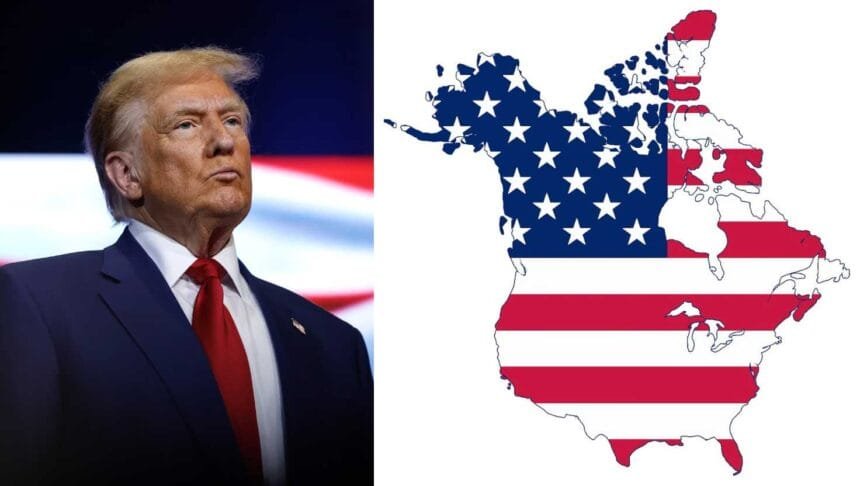In a series of controversial statements that have taken the internet and media by storm, former U.S. President Donald Trump recently outlined a vision of territorial expansion that has left political analysts, global leaders, and citizens questioning his motives and mental state.
Trump’s remarks, which include aspirations to annex Canada, seize the Panama Canal, and rename the Gulf of Mexico as the “Gulf of the USA,” have triggered a worldwide frenzy of debates about the implications of such rhetoric.
A Shocking Shift in U.S. Leadership
Trump, known for his polarizing style and unfiltered statements, appeared before the media with an aggressive tone that rivaled even the most ambitious expansionist regimes in history.
His bold declarations came with a disclaimer: he would not shy away from military force or economic pressure to achieve his objectives.
The internet erupted with questions: “Has Trump gone mad?” and “Is this the most extreme stance ever taken by an American leader?”
A Vision of Expansionism
Trump’s statements painted a vision of a United States unbound by conventional diplomacy. He hinted at using referenda, military intervention, and economic treaties to integrate territories like Canada and Greenland into the U.S.
This rhetoric is reminiscent of historical expansionist policies but stands out for its blatant disregard for international norms.
Even more startling were his remarks about the Panama Canal. Trump hinted at potentially using military force to seize control, declaring that “economic peace and security” would be his justification.
His claims echoed sentiments of dominance that critics say undermine the international rule of law.
Reactions from Global Leaders
The responses from world leaders were swift and unequivocal. Canadian Prime Minister Justin Trudeau dismissed Trump’s claims with a firm statement: “Not a chance in hell.
Canada will never merge with the United States.” Denmark, which governs Greenland, also reiterated its stance, stating unequivocally that Greenland would remain independent of U.S. control.
China and Russia, long criticized for their expansionist tendencies, could view Trump’s rhetoric as a green light to pursue their territorial ambitions.
Analysts warn that such bold declarations from the U.S. could destabilize global geopolitics, creating a domino effect where other nations justify aggressive expansion under the guise of sovereignty.
Historical Context and Abraham Lincoln’s Wisdom
Trump’s controversial statements also sparked comparisons with past U.S. leaders. A quote attributed to Abraham Lincoln, often regarded as one of the greatest American presidents, gained renewed attention:
“If you want to test a man’s character, give him power.”
Trump’s critics argue that his actions exemplify this idea. While in power, he has consistently tested the boundaries of political norms, wielding influence over institutions like the Republican Party and the Supreme Court.
With the backing of billionaire Elon Musk and a majority in Congress, Trump appears to feel emboldened to pursue policies that challenge established norms.
The Viral Map and Its Implications
Social media has amplified the debate, with a 1942 map of proposed U.S. territorial expansions going viral.
The map, which includes hypothetical annexations of Canada, Greenland, and parts of Latin America, has become a lightning rod for discussions about the implications of Trump’s vision.
While some dismiss the map as historical trivia, others see it as an eerie parallel to Trump’s modern-day ambitions.
A Dangerous Precedent?
Trump’s rhetoric also raises concerns about the message it sends to other global powers. Russian President Vladimir Putin, already embroiled in conflicts over territorial disputes, could interpret Trump’s stance as a validation of Russia’s actions in Ukraine and other regions.
Similarly, China’s President Xi Jinping, known for his ambitions in the South China Sea and Taiwan, might feel emboldened to escalate expansionist policies.
This could lead to a global arms race, with nations increasingly prioritizing military might over diplomacy.
The United Nations, already struggling to maintain relevance in a fragmented world, might face further challenges in curbing such aggressive policies.
Public Perception and the Media’s Role
The public’s reaction has been equally divided. Trump’s supporters view his statements as a bold reassertion of American strength, contrasting with what they perceive as weak leadership under previous administrations.
Meanwhile, critics argue that his rhetoric undermines the very principles of freedom and democracy that the U.S. claims to champion.
News outlets have played a significant role in amplifying the discourse. Cable news panels, online forums, and podcasts have dissected Trump’s statements, with some calling them a calculated political move to energize his base ahead of the 2024 elections.
Others see them as a reflection of genuine intentions, which could have far-reaching consequences for the world.
The Bigger Picture
As Trump’s remarks continue to dominate headlines, one thing is clear: his vision for America challenges conventional notions of diplomacy and governance.
While his critics warn of the dangers of unchecked power, his supporters believe he is ushering in a new era of American dominance.
What remains to be seen is how these statements will translate into policy and whether they will redefine America’s role on the global stage.
For now, the world watches with bated breath, hoping that cooler heads will prevail in the face of such bold and divisive rhetoric.



